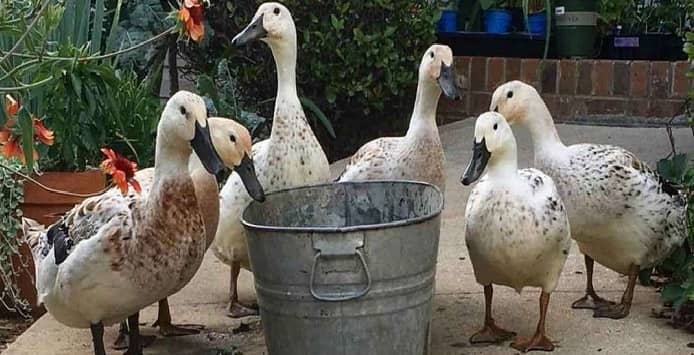Ducks and chickens have been the popular choice of livestock farming for thousands of years. That’s simply because they’re great sources of delicious meat and egg that many of us can’t imagine living without.
You can raise them right in your backyard to get your hands on the freshest food supplies or become self-sufficient!
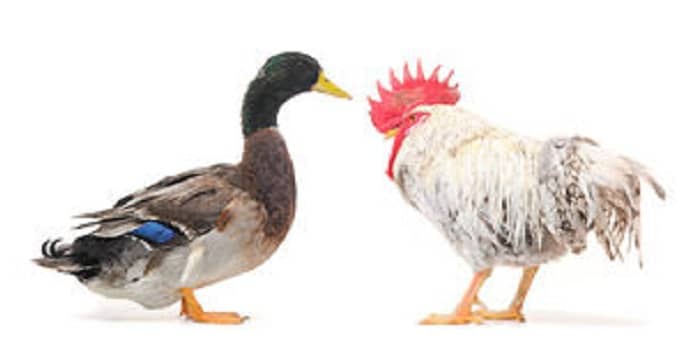
If you can’t decide which flock of poultry should populate your small farm or backyard, our take on the raising ducks vs. chickens debate should help you out!
We’re going to provide an in-depth comparison between these two of our favorite domestic fowls so that you can easily make a decision and get started quickly!
Which Is the Best for Egg Production?
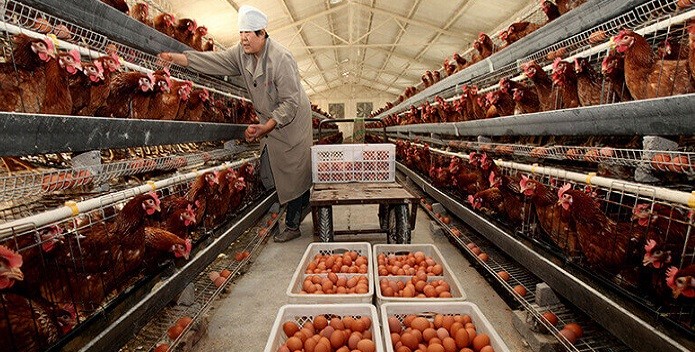
Chicken eggs are what we see the most in grocery stores and even supermarkets. This leads to the false assumption that chicken produces more eggs than ducks. That isn’t actually true because ducks are just as good at laying eggs if not better in some cases.
Under the suitable climate and condition, you will find that ducks easily surpass chickens at laying eggs.
Value of Eggs
Duck eggs tend to be 50-100% larger than chicken eggs. Both the chicken and duck eggs taste quite similar, but some find the taste of duck eggs to be more flavorful.
Many people get allergic reactions from chicken eggs, so they have to avoid them altogether. However, these people can freely eat duck eggs without worrying about allergies. It’s not as common to find people who have such conditions for both cases.
Both of the egg types are quite rich in nutrition, but duck eggs are loaded with comparatively more nutrients like iron, vitamin B12, folate, etc.
Egg Laying Cycles
Ducks will lay eggs for up to 9 years at almost the same rate. In comparison, chickens can lay eggs for up to 12 years, but their production rate tends to decline after 2 to 3 years.
Some of the high-quality egg-laying duck breeds can lay eggs for an even longer period than chickens. As we’ve mentioned before, ducks lay larger eggs than chickens.
One of the most convenient things about ducks is that they usually lay eggs from 4 am to 8 am while they’re inside their pens or wherever they’re kept at night. They are unlikely to drop eggs when they’re out foraging in the day.
As a result, you won’t have to go out on an egg hunt every day as you will find them all at once place.
As for chickens, their egg-laying habit can be unpredictable as they tend to lay eggs 24 hours. They can lay at any time of the day or night. So, you would have a harder time collecting them. However, you can train them to drop their eggs at specific locations.
Another important thing to note is that chicken’s egg production depends on daylight exposure. So, you will see lesser chicken eggs during the winter or whenever there is a lack of daylight. You will have to install a lighting system if you want to keep up the production rate. Ducks don’t have that problem.
You will have to feed your chicken more in the winter as they won’t be able to eat bugs or grass during those months. As both of these domestic birds molt, you’d have to make sure to provide more protein for them during that time. Otherwise, their egg production will be greatly reduced or stopped completely.
Best Duck Breeds for Egg Production?
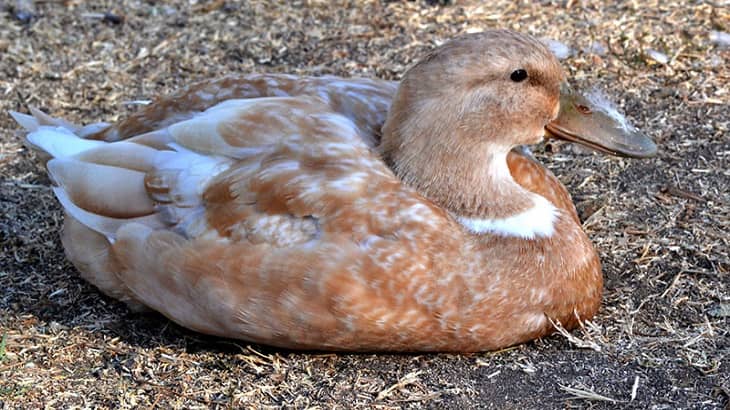
Here are some of the top duck breeds that are superior in terms of egg production. They can easily surpass the egg production of chickens.
Ancona: Lays 210 to 285 large eggs per year.
Campbell: Lays 250 to 345 large eggs per year.
Magpie: Lays 250 to 300 large eggs per year.
Buffs: Lays 150 to 225 large eggs per year.
Muscovy: Lays 180 to 200 extra-large eggs per year.
Best Chicken Breeds for Egg Production?
You will find these chicken breeds to be better at egg production than other breeds.
Isa Brown: Lays 300 large eggs per year.
New Hampshire Red: Lays 300 large eggs per year.
Golden Laced Wyandotte: Lays 200 large eggs per year.
White Leghorns: Lays 280 to 320 medium eggs per year.
Red Star: Lays 300 medium to large eggs per year.
Which Is the Best for Meat Production?
Duck and chicken meat are both equally healthy and nutritious. However, duck meats can have a larger volume of omega-3 and other nutrients if raised naturally.
Both of these meats can be tasty and flavorful, but chicken meats tend to be more popular. You have heard of Kentucky Fried Chicken but have you heard of Kentucky Friend Ducks? That is saying a lot. Duck meats are becoming more popular though.
As ducks have thicker feathers, you might have more trouble plucking them. However, the rest of the challenges are more or less the same.
You should know that ducks grow at a slower pace than chickens. However, they can be sold at more expensive prices.
Top Duck Breeds for Producing Meat
If you want to raise ducks for meat, here are some of the top duck breeds that are best for such purposes.
Rouen: Capable of growing up to 9 pounds.
Saxony: Capable of growing up to 10 pounds.
Jumbo Pekin: Capable of growing up to 11 pounds.
Muscovy: Capable of growing up to 14 pounds.
Pekin: Capable of growing up to 7 pounds.
Top Chicken Breeds for Producing Meat
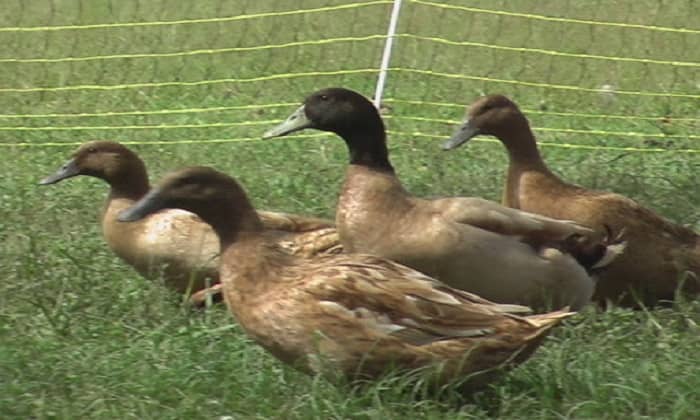
These are the best chicken breeds that will generate the most amount of meat for you.
Jersey Giant: Capable of growing up 13 pounds.
Cornish Cross: Capable of growing up to 12 pounds.
Orpington: Capable of growing up to 10 pounds.
Buckeye: Capable of growing up to 9 pounds.
Bresse: Capable of growing up to 7 pounds.
Diet and Foraging Habit
Both chickens and ducks are capable of foraging food. Their dietary habits are quite similar, consisting of grains, bugs, and greeneries. In comparison, ducks eat more greeneries like grass.
If you allow them to freely roam, they will wander around and seek food. This allows them to provide fresher and more nutritious eggs and meat. You will find naturally raised poultry to be richer in value compared to commercially raised birds. So, you should give them access to foraging as much as they want.
Chickens generally stick to the mainland while ducks freely go into the wetlands like ponds, lakes, waterways, etc. Although both of these species will eat any bug, chickens don’t like slugs and snails as much. Ducks, on the other hand, love nibbling on them.
Pest Control
As both ducks and chickens are fond of insects, you will see a massive reduction in pests once you start raising them. They will take care of most of the harmful bugs for you. They are fantastic for pest control as those insects will be too busy running for their lives or getting digested to cause any damage to your backyard!
Unlike chickens, ducks will eat slugs and snails. They won’t tear up your plants or scatter dirt all over the place. So, they’re the better option for dealing with bugs.
Confinement or Housing
Ducks are far easier to handle than chickens because they aren’t capable of flying or jumping as high. As a result, you can easily keep them inside low fences that are about 2 feet high. Just remember to give them enough food and water.
Chickens are lighter so they can fly high. Egg-laying chickens tend to get flightier. As a result, you’d have to build taller fences to have them confined. You might even have to cover the top. Otherwise, they will be flying out of their pens and you’d be too busy catching them.
On the plus side, chickens are faster so they can run away from the predators with ease. Ducks aren’t as fast and prefer moving in groups, so they aren’t all that good at running away from intruders.
Ducks aren’t fond of living under confined conditions. Their production rate will be reduced if you keep them in pens. They require more space as well. However, you won’t have to do much for their sleeping arrangement as they are comfortable sleeping on the floor.
That’s not the case with chickens as they may require raised bars for roosting at night.
Training Challenges
Although ducks and chickens have almost similar intelligence, many people find ducks to be easier to train. You will be able to teach ducks to return to their coop at dusk more easily than chickens. They are also friendlier. Chickens can be just as friendly though.
Since chickens are more skittish, they may not always get back to their pens so you would have to guide them home. Comparatively, chickens tend to be more aggressive as they often engage in fierce pecking activities.
Ducks tend to be gentler toward their species and others. Even if they start pecking at you for some reason, it won’t be all that painful because their beaks are rounded. Chicken pecking, on the other hand, can cause bleeding.
All in all, both of these birds are somewhat similar in terms of behavior. After some time, the challenges will become easier to overcome.
Herding Challenges
You will find ducks to be super easy to herd. They are more social, so they prefer moving around in groups. So, you won’t have to search for members that wander off. You can simply walk behind them with your hands raised to guide them. Occasional verbal commands like “Move on, Ducks!” will definitely help!
As a result, you can use separate areas for pens and foraging. You will be able to move them from these two parts easily, whenever you want to.
You can’t do the same with chickens because they cannot be herded. They don’t like moving in groups and prefer wandering around alone. So, you need to keep their coop and foraging areas close to each other. If you want to change the location of the foraging area, you’d also have to move their pens as well.
That’s why many people prefer to keep their chickens in chicken tractors. These are portable houses without any floor that can be moved easily. Ducks won’t do well in such houses because they require a floor and more space for sleeping.
Need for Water
Like any other living animal, ducks and chickens require water to live. However, ducks need a whole lot more water than chickens and that’s not just for drinking. They love to take baths in order to keep their feathers in good condition.
In addition, they like to swim as well, and their production rate will plummet if you don’t give them access to water. Chickens, on the other hand, will avoid waterbodies.
Ducks have a waterproof coating on their feathers, making them capable of resisting wet conditions.
Are Ponds Required for Keeping Ducks?
A popular myth says ducks can’t be raised without large ponds. It’s true that ducks require water for swimming and bathing, but it doesn’t have to be an actual pond. Building big ponds for them will be better but it’s not a prerequisite.
What they really need is a place where they can swim. It can be a small garden pond in your backyard or a kiddie pool. They won’t mind that as long as there is a clean source of water. It’s cute how they love to play in the water, but it also causes them to mess in it. So, make sure to change the water regularly.
Chickens don’t need any pond or water source as long as they’re sufficiently hydrated. As they’re capable of dust grooming, they don’t even need to take baths. They will just dig up a hole and sit there to become dry.
Ducks also need more water to drink compared to chickens. Different breeds require different volumes of water so you should find that out.
Health & Climate Consideration
Ducks tend to be better at resisting diseases than chickens. They’re stronger thanks to their dense feathers, and layers of subcutaneous fat.
Most of the duck breeds are capable of free-ranging throughout an entire year. Winter won’t be able to affect them as much. That’s because they come with waterproof feathers that can keep them nice and warm. Some of the breeds can even perform better in the winter!
Chickens, on the other hand, perform miserably under wintery conditions. Their feathers can’t protect them from the elements of weather. They use most of their energy to keep warm so their egg production rate will fall. Certain chicken breeds cannot be raised in winter at all.
Noisiness
Ducks are calmer and gentler than chickens. They aren’t as loud or noisy at all. Most people don’t find their quacks to be annoying and some even like them. They only quack at specific times like when they’re hungry, or when they’re playing in the pool.
Chickens, however, can get really noisy at times, especially the egg-laying hens who will start shouting left and right when they’re agitated. Also, we’re all familiar with morning chicken roosters. Thankfully, they remain relatively quiet rest of the time.
Is It Possible to Raise Ducks and Chickens Together?
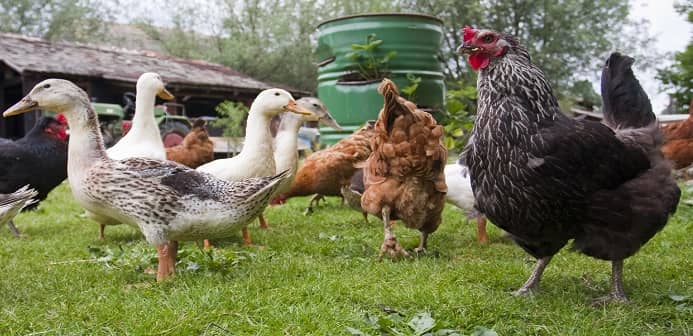
Now that you’ve read through the comparison, you should already be able to decide which flock of birds you should raise. If the idea of raising them together has struck you, that’s totally possible too!
That’s because ducks and chickens are very similar in many ways. For instance, they eat almost the same things and have similar behavioral habits. However, the differences can’t be ignored.
There are certain challenges of raising them together but if you’re aware of the differences and take the right actions, it won’t be all that hard.
First of all, you should keep them in separate sleeping quarters because chickens prefer sleeping on raised platforms while ducks like to sleep on floors. As ducks require tons of water, it can create a wetter environment which can be bad for the chickens’ health.
You should regularly check for any health issues and take necessary actions to deal with them before they become too great.
Also Check: Hen vs Rooster: Differences
Conclusion
As you can see, raising both types of birds have certain advantages and disadvantages. We’ve tried to clear everything up with our raising ducks vs. chickens comparison.
While chickens are more popular and considered to be the “gateway” farming animal, there is a surge in the popularity of ducks as well. You should take some time to think about both of these fowls and go with whichever suits you the most.
Regardless of your choice, you’re likely to have a lot of fun raising them. The idea of having access to fresh and natural eggs can be too appealing to pass off!

